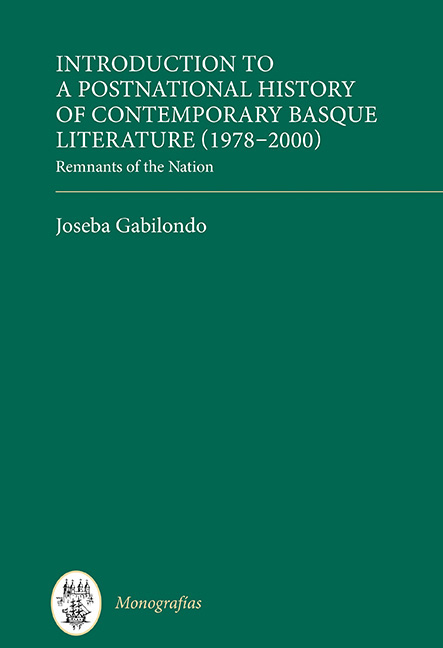 Introduction to a Postnational History of Contemporary Basque Literature (1978–2000)
Introduction to a Postnational History of Contemporary Basque Literature (1978–2000) Book contents
- Frontmatter
- Contents
- Preface and Notes on the Translation
- Acknowledgements
- I Postnational Theory and History
- II Writing the Nation: On Atxaga's Ethiopia and Obabakoak (1978-92)
- III After the Nation: Hybrid Postnational Literatures (1992-2000)
- 7 Before Babel: Globalization, Ethnic Hybridity, and Enjoyment
- 8 Terrorism as Memory: Historical Novels and Masochist Masculinity
- 9 Maternal Exile: Women Writers, Cultural Politics, and Individual Utopia
- 10 Melancholic Migrancy: Writing a Postnational Lesbian Self
- 11 Nationalist Crisis: Women's Literature and Neoliberalism
- Epilogue: Basque Literatures 2001-17
- Works Cited
- Index
7 - Before Babel: Globalization, Ethnic Hybridity, and Enjoyment
from III - After the Nation: Hybrid Postnational Literatures (1992-2000)
Published online by Cambridge University Press: 06 September 2019
- Frontmatter
- Contents
- Preface and Notes on the Translation
- Acknowledgements
- I Postnational Theory and History
- II Writing the Nation: On Atxaga's Ethiopia and Obabakoak (1978-92)
- III After the Nation: Hybrid Postnational Literatures (1992-2000)
- 7 Before Babel: Globalization, Ethnic Hybridity, and Enjoyment
- 8 Terrorism as Memory: Historical Novels and Masochist Masculinity
- 9 Maternal Exile: Women Writers, Cultural Politics, and Individual Utopia
- 10 Melancholic Migrancy: Writing a Postnational Lesbian Self
- 11 Nationalist Crisis: Women's Literature and Neoliberalism
- Epilogue: Basque Literatures 2001-17
- Works Cited
- Index
Summary
At the time when After Babel was in progress, the increasing domination of an Anglo-American Esperanto across the planet looked to be obvious and possibly irreversible […]. None the less, the picture now strikes me as somewhat less clear than it was. Fierce ethnic and regional atavisms are resurgent. Determinant of, determined by tribal, regional, and national passions for identity, languages are proving more resistant to rationalization, and the benefits of homogeneity and technical formalization, than one might have expected […]. Both Spanish and Chinese, moreover, are displaying energies of territorial and demographic acquisition which may come to challenge the American- English predominance. The question, and with it the future functions of interlingual translation, remains open […] After Babel aspires to reach […] anyone who makes the language live and who knows that the affair at Babel was both a disaster and – this being the etymology of the word ‘disaster’ – a rain of stars upon man.
George Steiner, After Babel (preface to the third edition)Basque Historical Positionality
Perhaps the biblical story of Babel could be a suitable starting point for a discussion about Basque culture and globalization. On the threshold of modernity, as Latin fragmented in romance languages, many authors resuscitated the biblical story of Babel to account for the more general linguistic breakup that ensued and led to the formation of nation-states. Today, in the era of full-blown globalization, linguistic fragmentation has not disappeared; on the contrary, it is increasing. It is no longer a phenomenon solely circumscribed to the European and Western world; it is affecting the entire globe. The new emergence of minority ethnicities and cultures is intensifying their Babelic effect to the point that one could speak of ‘micro–fragmentation’, at the sub–state level, as in the case of Basque language. Nowadays, the survival of a language or culture is not necessarily connected to the formation of a nation–state. Likewise, this putative micro–fragmentation is not incompatible with the new macro status of English. Regarding language as well, globalization poses again another interesting conundrum, the outlines of which Fredric Jameson has thoroughly detailed.1 This is thus the Babelic paradox of globalization in which Basque is caught. But then again, Babel is an old myth in Basque culture, one with a very old discursive history of its own.
- Type
- Chapter
- Information
- Introduction to a Postnational History of Contemporary Basque Literature (1978–2000)Remnants of the Nation, pp. 157 - 196Publisher: Boydell & BrewerPrint publication year: 2019


